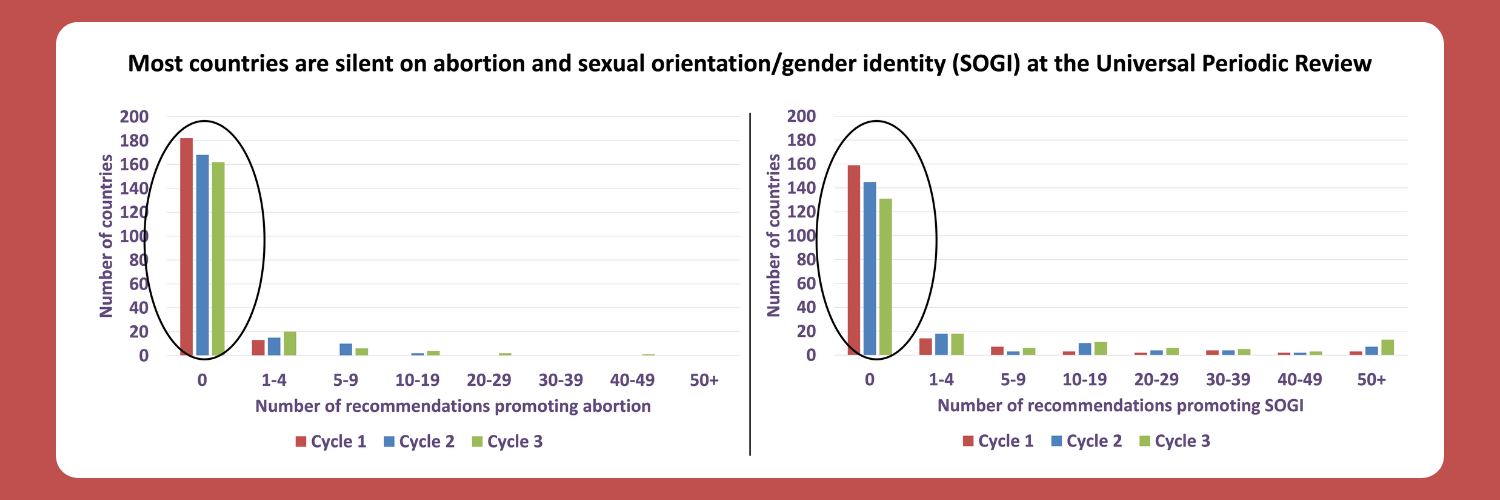WASHINGTON, D.C. June 27 (C-Fam) The Universal Periodic Review (UPR) is a process whereby individual governments at the UN give each other recommendations on how to improve their human rights records. C-Fam’s human rights database offers a window into governments’ human rights priorities on social issues, both in terms of what they say and what they do not say.
Recommendations made in the UPR are brief and the recipient government responds briefly; either “supported” or “noted.” Across the three completed and fourth ongoing cycles of the UPR, tens of thousands of recommendations have been exchanged between governments, providing an opportunity for deeper analysis into which issues receive the most attention (the number of recommendations made on that subject) and the level of agreement across governments (whether they are “supported” when received).
And here is a surprising fact revealed in C-Fam’s database; relatively few UPR recommendations explicitly mention abortion or sexual orientation/gender identity (SOGI). Abortion appears in fewer than 1 percent of recommendations, while SOGI appears in fewer than 4%. Across the first three UPR cycles, about 73% of recommendations were supported, but for abortion and SOGI recommendations, the figure drops by roughly half.
Perhaps the most telling finding is what’s not being said. More than half of the world’s nearly two hundred governments did not make a single recommendation on abortion or SOGI in each UPR cycle. In the case of abortion, at least 160 out of 193 governments remained silent on the issue.
Meanwhile, a few governments have been very outspoken, with Iceland as the extreme outlier on both issues. In the third UPR cycle, Iceland pressured other governments on abortion 48 times, accounting for 21% of all abortion pressure in that cycle. In the ongoing fourth cycle, Iceland has already pressured governments 71 times, which is 28% of the total. Iceland also leads the world in SOGI pressure – in the ongoing fourth UPR cycle, it issued 239 relevant recommendations, or 18% of the total.
Sometimes, the UPR information in the database reflects political changes within nations. Since Donald Trump began his second term as president, the U.S. has not issued a single recommendation in the UPR, and it remains to be seen how (and if) the U.S. will handle its own scheduled review in November. Since Ireland legalized abortion, it has begun to pressure other governments to decriminalize abortion in all cases (Costa Rica) and establish legal grounds under which it is permitted (El Salvador and Malta).
Certain governments are particular targets for pressure on these issues. Latin American countries like Chile and El Salvador have drawn the bulk of international abortion pressure, although the European country of Malta, which maintains strong pro-life laws, also faces heavy pressure. The Western Europe and Others geopolitical group, which includes the U.S., accounts for almost 80% of UPR abortion pressure.
While El Salvador and Malta “noted” all the recommendations that they liberalize their abortion laws, in Chile’s most recent UPR review, its government expressed support for every pro-abortion recommendation it received.
The database contains pages for each country’s participation in each UPR cycle. It lists the incoming recommendations on abortion and SOGI, respectively, marked as “supported” or “noted.” It also contains a link to the country’s full report with all recommendations it received. Beneath that information is a list of all relevant outgoing recommendations made by that country on the same issue throughout the entire cycle, which reviews each country over 4 to 5 years.
View online at: https://c-fam.org/friday_fax/c-fam-human-rights-database-provides-window-into-human-rights-priorities/
© 2025 C-Fam (Center for Family & Human Rights).
Permission granted for unlimited use. Credit required.
www.c-fam.org









